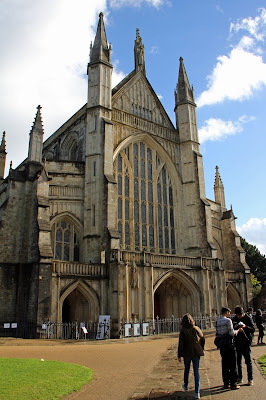"Nothing is easier than denouncing the evildoer; nothing more difficult than understanding him." -- Fyodor Dostoevsky
_______________________
Have you noticed...
That the more popular and famous celebrities are, the more likely they will become an embarrassment, if not to themselves then to anyone with a sense of propriety.
That the politicians who are most vociferous in their support for public schools send their own children to private schools. They realize, but will never openly admit, that many of our public schools are failing, so they gladly pay to send their children to schools that will actually educate their children.
That the elitists -- the politicians, academics, and celebrities -- who seem most concerned about the human impact on "climate change" are the same folks who ride around in big SUVs and fly private jets to their climate change conferences? Oh, yes, and whatever happened to global warming?
That these same elitists, who support confiscating firearms owned by law-abiding citizens, are always surrounded and protected by armed bodyguards? You and I simply aren't important enough to be allowed to protect ourselves and our families from those who would do us harm, from those who ignore all laws, including so-called "gun control" -- really, people control -- laws.
That the leadership of the Democrat Party loves to accuse conservatives of racism, despite the Democrats' active and public support of Planned Parenthood, an organization founded by racist Margaret Sanger, who wanted nothing less than the elimination of what she believed to be the lesser races. Concerned that this aim might become public, she wrote to Dr. Clarence Gamble, "We don't want the word to get out that we want to exterminate the Negro population."
That after a black couple armed with rifles stormed into a kosher grocery store in Jersey City and killed three people, some in the liberal media -- and, of course, US Rep. Rashida Tlaib -- blamed the killings on "white supremacy." Interestingly, the murderous couple, members of a fun pseudo-religious group that oddly calls itself the "Black Hebrew Israelites," admitted to being full-fledged haters. In the words of one of the killers, "I do this because my creator makes me do this and I hate who he hates." Yep, certified, self-proclaimed haters.
That politicians who claim their policies and legislation are designed only to "help the children" are loudest in their support for abortion "rights" -- the right to kill those little ones before they are born.
That when politicians say they're "personally against abortion, but respect a woman's right to choose," media folks never ask the obvious question: "Why, exactly, are you personally against abortion?" I would really like to hear their answers to this question.
Finally, that for the left, it's all about abortion. Abortion trumps everything else. Yes, indeed, if a politician supports every wacko left wing policy, but is openly prolife, he or she will be vilified, silenced, and ostracized.
That the elitists -- the politicians, academics, and celebrities -- who seem most concerned about the human impact on "climate change" are the same folks who ride around in big SUVs and fly private jets to their climate change conferences? Oh, yes, and whatever happened to global warming?
That these same elitists, who support confiscating firearms owned by law-abiding citizens, are always surrounded and protected by armed bodyguards? You and I simply aren't important enough to be allowed to protect ourselves and our families from those who would do us harm, from those who ignore all laws, including so-called "gun control" -- really, people control -- laws.
That the leadership of the Democrat Party loves to accuse conservatives of racism, despite the Democrats' active and public support of Planned Parenthood, an organization founded by racist Margaret Sanger, who wanted nothing less than the elimination of what she believed to be the lesser races. Concerned that this aim might become public, she wrote to Dr. Clarence Gamble, "We don't want the word to get out that we want to exterminate the Negro population."
That after a black couple armed with rifles stormed into a kosher grocery store in Jersey City and killed three people, some in the liberal media -- and, of course, US Rep. Rashida Tlaib -- blamed the killings on "white supremacy." Interestingly, the murderous couple, members of a fun pseudo-religious group that oddly calls itself the "Black Hebrew Israelites," admitted to being full-fledged haters. In the words of one of the killers, "I do this because my creator makes me do this and I hate who he hates." Yep, certified, self-proclaimed haters.
That politicians who claim their policies and legislation are designed only to "help the children" are loudest in their support for abortion "rights" -- the right to kill those little ones before they are born.
That when politicians say they're "personally against abortion, but respect a woman's right to choose," media folks never ask the obvious question: "Why, exactly, are you personally against abortion?" I would really like to hear their answers to this question.
Finally, that for the left, it's all about abortion. Abortion trumps everything else. Yes, indeed, if a politician supports every wacko left wing policy, but is openly prolife, he or she will be vilified, silenced, and ostracized.



















